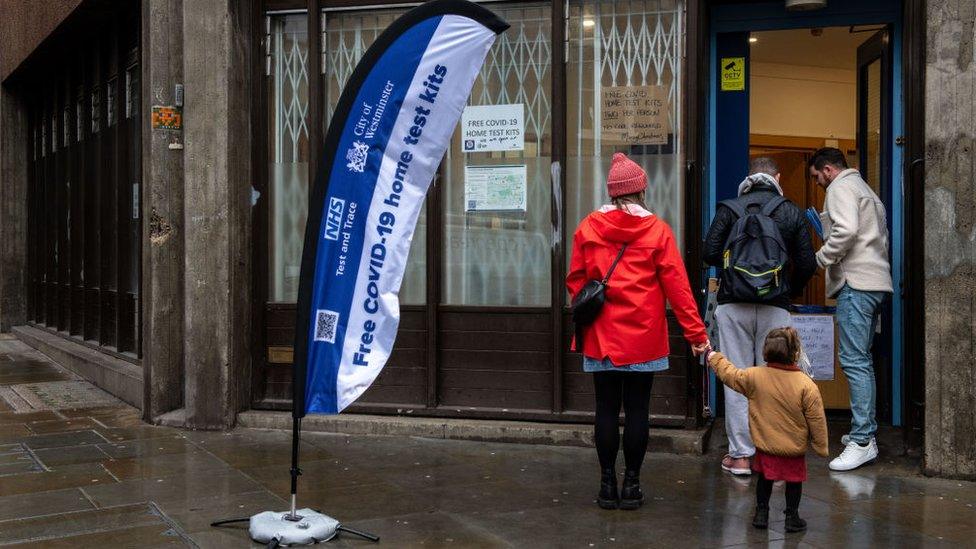Covid: Warning over patchy lateral flow test supply
- Published

Pharmacists are warning of patchy supplies of rapid Covid tests following changes to self-isolation rules.
They said demand for lateral flow tests increased after changes allowed people with Covid in England to end isolation after seven days if they test negative.
The Association Of Independent Multiple Pharmacies said staff and customers were stressed over the lack of supply.
The UK Health Security Agency (UKHSA) said test availability is refreshed throughout the day.
"During periods of exceptional demand there may be temporary pauses in ordering or receiving tests, to ensure we manage distribution across the system", it added.
Labour said the situation was a "total shambles" and the government should help people "trying to do the right thing" by ordering tests.
Omicron cases now constitute more than 90% of all community Covid cases in England, the UKHSA said on Wednesday.
A total of 10,462 people were in hospital with Covid in England as of Wednesday morning, according to figures from NHS England.
This is up 48% from a week ago and is the highest number of admissions since 1 March.
Not all the patients in hospital will have been admitted for Covid - latest data suggests about three in 10 have the virus but were admitted to hospital for something else.


The number of people with Covid in hospital has risen above 10,000 in England for the first time in nearly 10 months.
There are currently 10, 462 patients with the virus in hospital.
That is the highest level since the start of March - and means the numbers have risen by 2,000 in just two days.
Admissions for Covid are rising, the weekly average is more than 50% higher than it was a week ago.
But other factors are likely to have contributed to the increase, including a drop in the numbers being discharged.
Last Christmas the numbers leaving hospital more than halved as it is more difficult to discharge patients over the festive period.
It means there are likely to be hundreds of patients in hospital who have recovered from Covid but just have not left yet.
The proportion of hospitalisations for what is known as an incidental admission is also growing and contributing to the increase. These are people being treated for something else, but happen to have Covid.
Last week, these cases accounted for around three in 10 patients in hospital, but the expectation is this will have increased by now.
But the numbers who are acutely unwell with Covid are still going up and it could be the end of January before they peak.
Hospital cases are though rising more slowly than cases, once again showing the Omicron variant is leading to milder illness.

The latest daily Covid case number stands at a record 117,093.
Partial data from the UK nations means a full national picture will only be available again in the first week of January.
Angry customers
The warnings about the supply of rapid lateral flow Covid tests come after several changes to self-isolation rules.
Those who test positive for Covid can now leave home after seven days - as long as they test negative via lateral flow devices on day six and seven - in England.
And fully-vaccinated close contacts of positive cases, including those in the same household, can go about their daily lives as normal with a daily negative lateral flow test in England, Wales and Northern Ireland.
Leyla Hannbeck, chief executive of the Association Of Independent Multiple Pharmacies, told BBC Radio 4's Today programme there had been a very high demand for lateral flow tests since the changes.
"Every five minutes, approximately, somebody comes into the pharmacy and asks for tests," she said.
"But unfortunately because of the issues around supply being patchy and inconsistent it means that those who come forward for the test don't always get it, which is very stressful not just for the pharmacy but also for the patients."
Thorrun Govind, chair of the Royal Pharmaceutical Society in England, said having an online collection code for lateral flow tests does not guarantee they will be in stock at a chemists.
She also urged the public not to become angry with pharmacy staff and pleaded for patience amid the increased demand.
Watch Boris Johnson call for people to "enjoy New Year in a cautious way... but above all get a booster"
The UKHSA said that the delivery capacity for lateral flow testing kits has doubled to 900,000 a day since 18 December, due to unprecedented demand.
Lateral flow tests are also available to order online, external for delivery through Royal Mail - but many people have reported problems placing orders, with the website often saying "sorry, there are no home delivery slots left for rapid lateral flow tests right now".
The UKHSA said "exceptionally high demand" for Covid PCR appointments - tests used to confirm a positive lateral flow result - could lead to temporary reduced availability in some areas but currently there are tests available to book online.
"We have made 100,000 more PCR booking slots available per day since mid-December and we are continuing to rapidly expand capacity, with over half a million tests carried out on 23 December alone."
The agency also said Christmas post schedules could be impact deliveries - but work and pensions minister Chloe Smith said people should "persevere" in their efforts to secure Covid tests.
Separately, record demand for Covid PCR tests has left some people waiting up to five days for results in Scotland.
In other developments:
Prime Minister Boris Johnson said people who have not been fully vaccinated were "eight times more likely" to get seriously ill with Covid
Matthew Taylor, head of the NHS Confederation, said staff absence "is a huge issue for the NHS right now"
Health Secretary Sajid Javid criticised restrictions in Wales after group run organisers Parkrun cancelled meets following the introduction of fresh Covid curbs there
People in Scotland have been urged not to travel to England for new year celebrations as doing so would go against the "spirit" of restrictions, the Scottish government says.

Why do people need lateral flow tests?

Free-to-order rapid tests are seen as a crucial way to keep safe as Covid cases surge. Countries like the US have scrambled to follow the UK's lead in providing mass lateral flow tests free of charge.
They are useful in showing whether a person is infectious - providing trustworthy results in just 30 minutes. They are used:
To allow people with Covid to leave isolation after seven days - by testing negative on day six and seven - in England
By those in close contact with Covid cases to avoid isolation through daily rapid testing in England, Wales and Northern Ireland
To reassure people without symptoms they are not infectious before seeing vulnerable relatives or attending new year gatherings
In secondary schools, which require regular rapid testing, as well as some workplaces

There have been calls by some scientists and business leaders for the government to follow the example of US health officials and reduce the isolation period in England for people with asymptomatic Covid, to five days.
But a government spokesperson said the current isolation period - which was recently lowered from 10 to seven days - remained "critical for limiting the spread of the virus".
They said: "There are no further changes to the isolation period planned at this time, but we keep all rules under review based on the latest health data".
Unlike Scotland, Wales and Northern Ireland, the government has decided against introducing new Covid measures in England ahead of the new year.



A VERY BRITISH SCANDAL: One of the most notorious and brutal legal cases of the 20th Century
A STUNNING WINTER WALK: Shepherdess Amanda Owen takes us through the Yorkshire Dales


Have you been affected by the availability of Covid tests? Share your experiences haveyoursay@bbc.co.uk, external.
Please include a contact number if you are willing to speak to a BBC journalist. You can also get in touch in the following ways:
WhatsApp: +44 7756 165803
Tweet: @BBC_HaveYourSay, external
Please read our terms & conditions and privacy policy
If you are reading this page and can't see the form you will need to visit the mobile version of the BBC website to submit your question or comment or you can email us at HaveYourSay@bbc.co.uk, external. Please include your name, age and location with any submission.

Related topics
- Published28 December 2021

- Published5 July 2023

- Published1 July 2022
